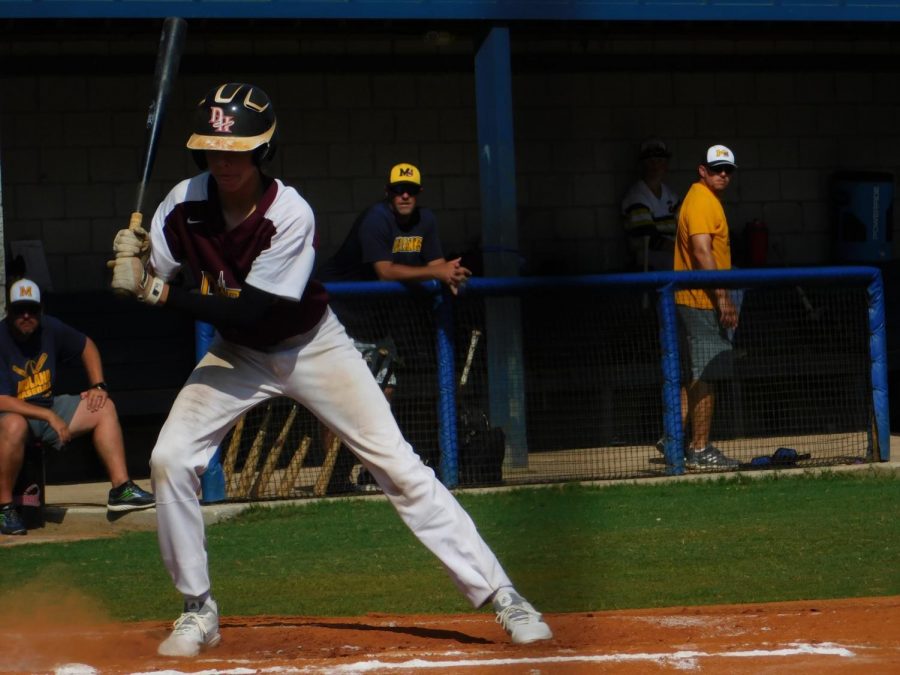Baseball challenges players mentally
Junior and varsity player Charlie Payne prepares to swing during the summer of 2020 as a player for Dunwoody Diablos Baseball.
March 19, 2021
For a sport commonly knocked for its slow-paced games, there is a lot more that goes on in the heads of baseball players than meets the eye.
“Baseball is 90 percent mental,” said Yogi Berra, the late New York Yankees Hall of Fame catcher. “The other half is physical.’’
Extreme nervousness, or rather the yips, can take a toll even on professional players. Perhaps the best example of the yips wreaking havoc is the story of Rick Ankiel, who entered Major League Baseball in 1999 as a remarkable pitcher for the St. Louis Cardinals. He went on to have an impressive rookie season until, suddenly, in the first round of the playoffs, the yips consumed him, and he threw five wild pitches in one inning, tying the record set in 1890.
“‘The Thing,’ ‘The Yips,’ ‘The Monster,’ whatever you want to name it,” Ankiel said. “You lose your ability to do something that you’ve done your whole life without the explanation of why.”
The yips can also be harmful in high school baseball.
“Obviously, it takes skill to play the game of baseball — it’s not an easy game — but what also makes the game difficult to play is the fact that you have to be mentally prepared and mentally tough at the same time,” said senior and varsity player Christian Smith, who has committed to Vanderbilt University for baseball. “If you’re not mentally there, your success rate is not going to be very high.”
Players are very susceptible to getting the yips while they are batting because there is a significant amount of attention placed on them. They can either get a hit and thus contribute to the team — something not easily done — or they can strike out and let everyone down; there is no in-between.
“When you’re standing in the batter’s box, you’re aware that everybody’s eyes are on you, so when you’re hitting, it’s really difficult sometimes to tune it all out,” junior and varsity player Drew Gossett said.
Plus, players do not get many chances to prove their worth. On offense, they average three at-bats per game, and on defense, they do not frequently touch the ball, which can cause them to worry excessively about messing up once they get their shot.
“Anxiety can come from just fear of making a mistake, whether that be in the field or at the plate,” junior and varsity player Charlie Payne said. “When you make one mistake, your coaches will always tell you to kinda forget about it because, once that happens, then you kinda start worrying, ‘What if I mess up the next play?’”
For Gossett, the secret to fighting the yips is simply trusting his instincts.
“I really think it’s confidence-based,” Gossett said. “It’s weird, but I’ll step in the box, and I’m trying to get as angry as possible with the dude that I’m staring at. You would think, ‘Oh, try to calm yourself down to get the yips away,’ but it’s really about having a lot of trust in yourself, knowing that when I react, when I do what I need to do, I’m going to do it the right way, and I don’t have to think about it to do it.”
Likewise, Smith said that staying poised while playing is crucial.
“Confidence is a really big thing in this game,” Smith said. “You have to be confident in order to play well. You have to think, ‘I’m better than the guy that I’m facing.’”
Payne, however, prefers a different approach: Do not take the sport so seriously, and have fun.
“The whole point of it is for you to enjoy it, so when you’re stressing about all of these bad things happening, it takes away from that enjoyment, and it also causes you to usually perform worse,” Payne said. “Our coach always tells us, ‘Don’t forget the whole reason why you’re there,’ which is to have fun and play the game you love.”
Head coach Daniel Stockdale strives to ensure that players do not fall victim to the mental challenges of the sport.
“We just try to keep it as simple as possible for our guys,” Stockdale said. “We tell them every single day just to go out there, have fun, catch the ball, throw the ball and be aggressive at the plate. At the root of it all, you just have to relax, trust your training, see it and hit it.”
Unfortunately, despite a great deal of effort and laser focus, failure is prevalent in the sport. Players are considered exceptional if they can get a hit three out of 10 times.
“That is probably the most frustrating part about the game,” Gossett said. “Despite what a lot of people think, we work really hard. Oftentimes, when you put in that much work, you feel like you deserve to have success, but the really bad thing about baseball is even the most successful guys on the professional level, in numbers, aren’t really having that much success. So, it’s this odd dynamic between we feel a sense of entitlement to succeed, but then the game is not meant to give you that much success, so that’s, obviously, incredibly frustrating.”
Accordingly, players have to become accustomed to that relative lack of success.
“I do think I’m able to handle failure a little bit better,” Smith said. “Of course, I don’t like failing — failing sucks — but I think playing this game has definitely helped me know that failure is going to happen; it’s just how you come out of it, basically.”
If players are hard on themselves after every mishap, they will not progress, according to Gossett.
“Baseball is so much of a mental game that if you get inside your own head, and then you start thinking, and you start doubting yourself, and you start putting yourself down, you’re only going to fail more,” Gossett said.
That is why Payne said that perseverance is more important in baseball than any other sport.
“Failure is half of baseball,” Payne said. “When it happens, let it go, and go to the next play.”







